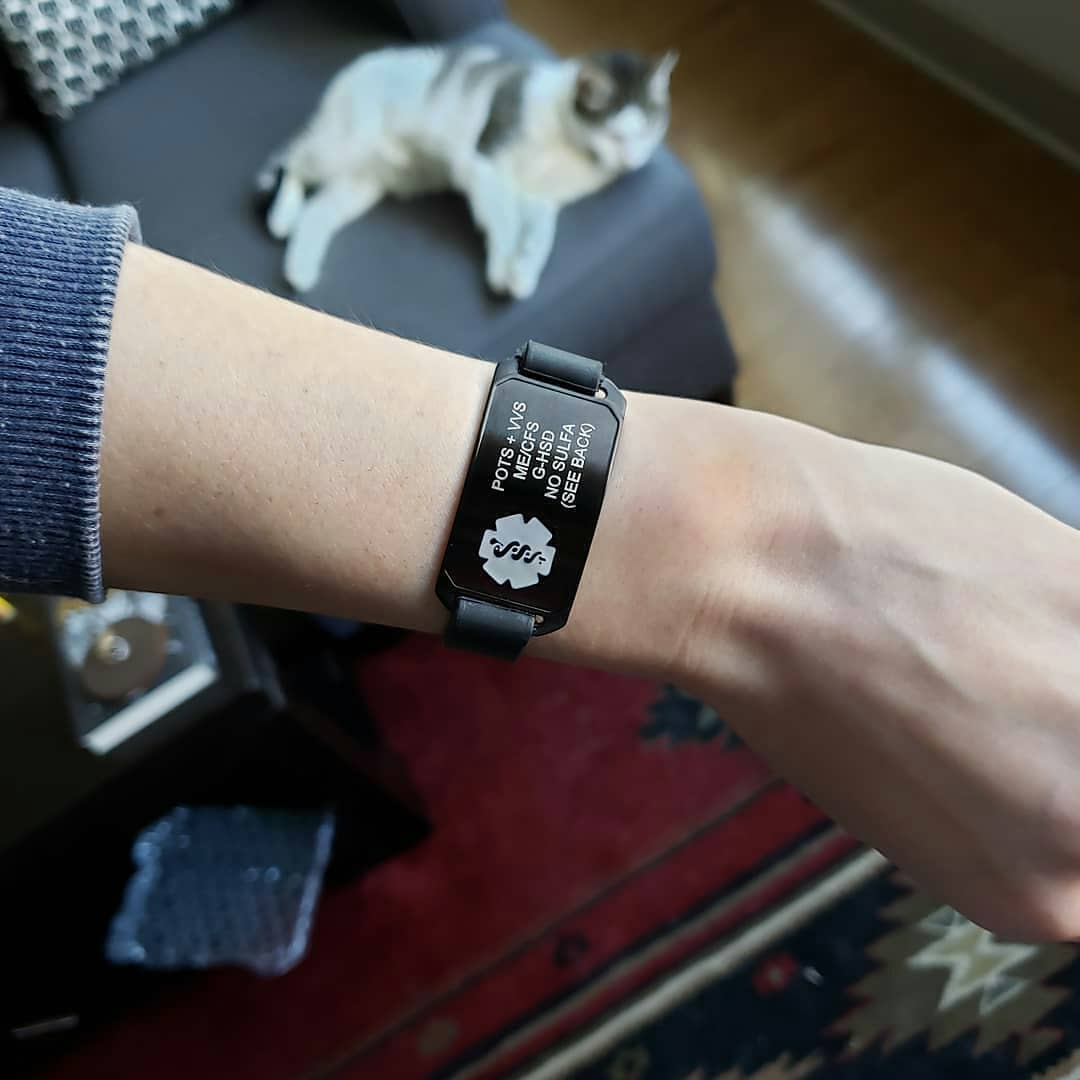

Medical Alert IDs for Postural Orthostatic Tachycardia Syndrome (POTS)
POTS is a medical condition that affects a person's autonomic nervous system and blood flow. This disorder can cause sudden increase of their heart rate that is most notable when changing the body's positions such as sitting, standing, or lying down. While standing, a person with POTS may experience lightheadedness and fatigue as there is not enough blood circulating to their brain from the lower half of their body.
One of the biggest risks for people with POTS is falls due to fainting. A study shows that Postural Orthostatic Tachycardia Syndrome is often misdiagnosed by doctors as anxiety, panic attacks, depression, or some other psychological disorder. Wearing a medical ID can alert others of Postural Orthostatic Tachycardia Syndrome to avoid misdiagnosis.


"Medical IDs provide health personnel, bartenders, bystanders with important information that, in a situation where you may not be able to communicate, they otherwise would be unable to obtain. Information that could literally mean life and death." - @dancingwithdys
Types of Postural Orthostatic Tachycardia Syndrome
A medical ID can quickly communicate the presence and type of Postural Orthostatic Tachycardia Syndrome that a patient has so that emergency responders, doctors, and nurses can be alerted of its symptoms and the special care that POTS specifically requires. Some of the most common types of this chronic condition are:
- Neuropathic - characterized by damaged small fiber nerves that manage blood flow in the limbs and abdomen.
- Hyperadrenergic - presence of higher levels of the stress hormone norepinephrine.
- Hypovolemic - when a patient has unusually low blood levels.
Source: WebMD
Common Symptoms of POTS
According to Cleveland Clinic, POTS symptoms can be uncomfortable and frightening experiences. Patients with POTS usually suffer from two or more of the following symptoms:
|
|
Medical IDs and Postural Orthostatic Tachycardia Syndrome in Emergencies
In an emergency, Postural Orthostatic Tachycardia Syndrome can be hard to identify but it is crucial to alert emergency responders of this medical condition to avoid misdiagnosis and unnecessary trips to the hospital.
A medical ID can also direct others to look for an emergency wallet card that can provide additional information such as:
- An explanation of symptoms, such as frequent fainting
- The need to sit down or lie flat to recover
- When to call an ambulance i.e. if unconscious for more than several minutes
- List of emergency contacts or primary physician
A medical ID bracelet or necklace for POTS can help ensure that this medical condition is recognized in emergencies and that safe and accurate treatment is given.
What to Engrave on a POTS Medical ID


Engraved information on a medical ID bracelet or necklace for Postural Orthostatic Tachycardia Syndrome is helpful to anyone responding to an emergency. In engraving a POTS emergency ID, make sure that it contains accurate information that is easy to read, even in the most difficult situations when the patient has fainted, becomes unconscious, or is experiencing brain fog and are unable to advocate for their health and safety.
- Wearer’s name
- Postural Orthostatic Tachycardia Syndrome (POTS)
- Common symptoms such as faint risk, or a prompt to be laid down when unconscious
- Other medical conditions or allergies that may or may not be related to POTS such as Dysautonomia or Ehlers Danlos Syndrome
- Prescribed medications or medications to avoid


"I had trouble communicating with EMS and ER staff last month due to pain and the ME/CFS, and was reminded that I cannot communicate at all when having an episode of ME-induced paralysis. I don't have those episodes often, but the likelihood increases with mental or physical stress (such as during a medical emergency. One doctor recommended getting an ID bracelet so I don't have to worry about such a scenario. I went with this one from @americanmedicalid and it's proving to be a good fit and very comfortable (I keep forgetting I'm wearing it). I'm especially pleased as neuralgia can make a lot of jewelry and clothing become uncomfortable or painful to wear for extended amounts of time. I also like being able to engrave both sides, and I think the black metal looks slick. This is the Onyx Large Silicone Flex bracelet." - @bionictilly

 - UK
- UK  - Canada
- Canada  - Australia
- Australia 
